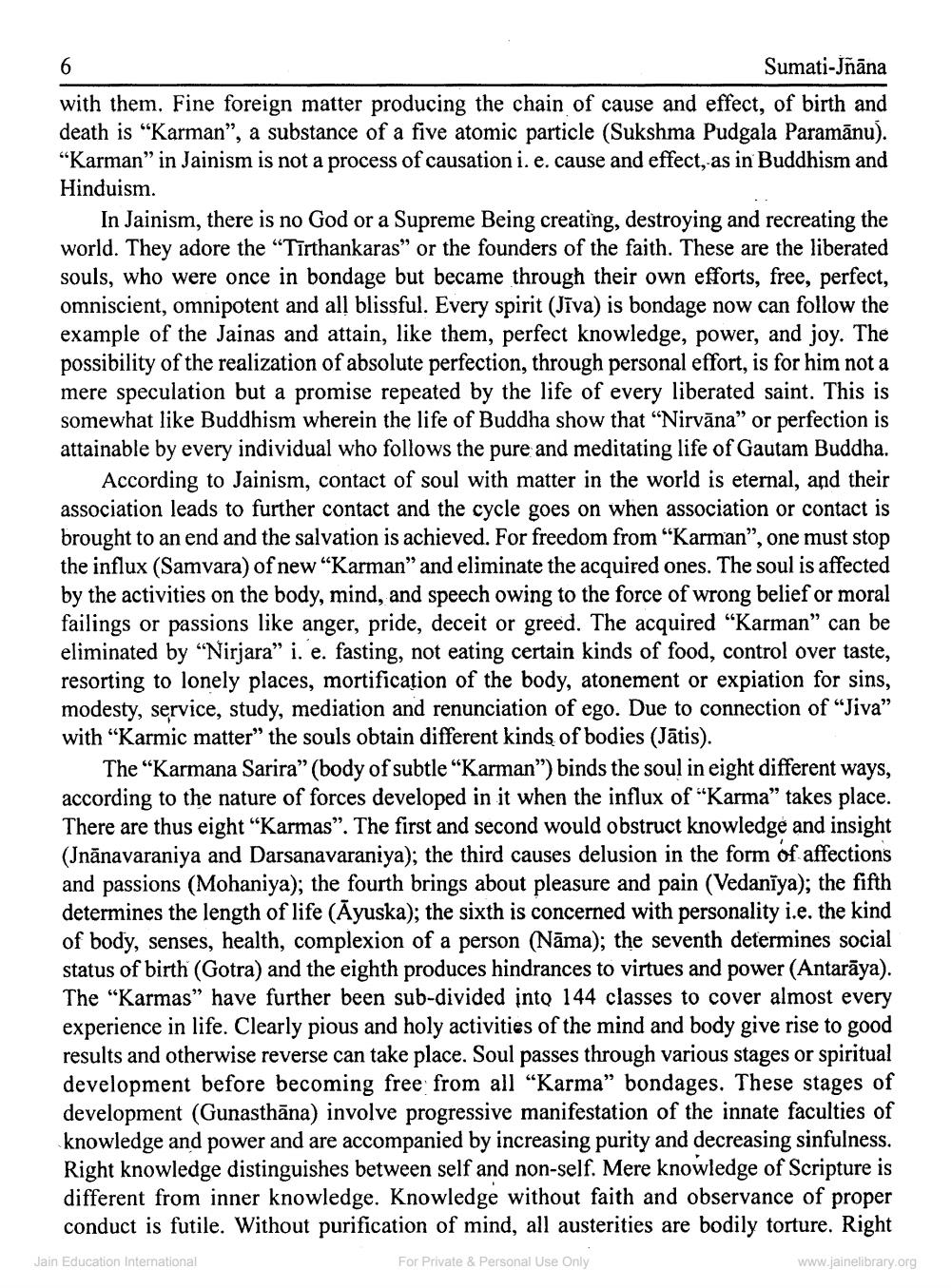________________
Sumati-İnāna
with them. Fine foreign matter producing the chain of cause and effect, of birth and death is "Karman", a substance of a five atomic particle (Sukshma Pudgala Paramānu). “Karman” in Jainism is not a process of causation i. e. cause and effect, as in Buddhism and Hinduism.
In Jainism, there is no God or a Supreme Being creating, destroying and recreating the world. They adore the “Tīrthankaras" or the founders of the faith. These are the liberated souls, who were once in bondage but became through their own efforts, free, perfect, omniscient, omnipotent and all blissful. Every spirit (Jīva) is bondage now can follow the example of the Jainas and attain, like them, perfect knowledge, power, and joy. The possibility of the realization of absolute perfection, through personal effort, is for him not a mere speculation but a promise repeated by the life of every liberated saint. This is somewhat like Buddhism wherein the life of Buddha show that "Nirvāna" or perfection is attainable by every individual who follows the pure and meditating life of Gautam Buddha.
According to Jainism, contact of soul with matter in the world is eternal, and their association leads to further contact and the cycle goes on when association or contact is brought to an end and the salvation is achieved. For freedom from "Karman”, one must stop the influx (Samvara) of new “Karman" and eliminate the acquired ones. The soul is affected by the activities on the body, mind, and speech owing to the force of wrong belief or moral failings or passions like anger, pride, deceit or greed. The acquired “Karman" can be eliminated by “Nirjara" i. e. fasting, not eating certain kinds of food, control over taste,
orting to lonely places, mortification of the body, atonement or expiation for sins, modesty, service, study, mediation and renunciation of ego. Due to connection of “Jiva" with "Karmic matter" the souls obtain different kinds of bodies (Jātis).
The “Karmana Sarira” (body of subtle “Karman") binds the soul in eight different ways, according to the nature of forces developed in it when the influx of "Karma" There are thus eight "Karmas”. The first and second would obstruct knowledge and insight (Jnānavaraniya and Darsanavaraniya); the third causes delusion in the form of affections and passions (Mohaniya); the fourth brings about pleasure and pain (Vedanīya); the fifth determines the length of life (Āyuska); the sixth is concerned with personality i.e. the kind of body, senses, health, complexion of a person (Nāma); the seventh determines social
s of birth (Gotra) and the eighth produces hindrances to virtues and power (Antarāya). The “Karmas" have further been sub-divided into 144 classes to cover almost every experience in life. Clearly pious and holy activities of the mind and body give rise to good results and otherwise reverse can take place. Soul passes through various stages or spiritual development before becoming free from all “Karma” bondages. These stages of development (Gunasthāna) involve progressive manifestation of the innate faculties of knowledge and power and are accompanied by increasing purity and decreasing sinfulness. Right knowledge distinguishes between self and non-self. Mere knowledge of Scripture is different from inner knowledge. Knowledge without faith and observance of proper conduct is futile. Without purification of mind, all austerities are bodily torture. Right
Jain Education International
For Private & Personal Use Only
www.jainelibrary.org




